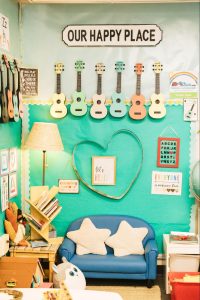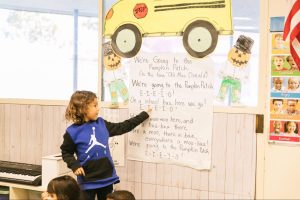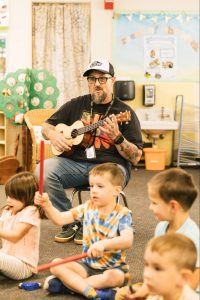
Julia Cole has been a teacher in the La Mesa-Spring Valley school district for more than 20 years and currently teaches transitional kindergarten at Murray Manor Elementary. She has taught mostly kindergarten for the past 20 years, at both Murray Manor and Avondale Elementary, as well as time teaching first, second, and third grade.

“My main love is the first year of school, and by teaching TK I feel like I’ve died and gone to teaching heaven!” she laughs. “It’s exactly where I want to be – with the art and music, and just giving the children all those first experiences.”
Regarding music, Cole refers to Guitars in the Classroom (GITC), a San Diego-based organization that trains teachers in public elementary schools nationwide to sing and play instruments like the ukulele and guitar. The lessons also include writing song lyrics so teachers can integrate music-making into the classroom; Cole has been a participant in the training and now serves as a trainer of other teachers.
Teachers Empowering Teachers
Cole’s passion for the program is evident as she describes how it grew organically from humble beginnings almost 25 years ago thanks to founder and educator Jess Baron: “Jess started it in 2000, with the idea of getting music into general ed classrooms when music programs were being taken away.”
Baron was a teacher at the time. “Other teachers on her campus saw kids leaving her room singing and talking about music. They saw ukuleles and guitars and said, ‘Can you come to our class and do music with our kids?’ And Jess said, ‘Sure!’”

“That’s how it started – not as a music program but by just enhancing the regular general ed classes by bringing music into them.”
The organization quickly expanded and over 15,000 teachers have trained with GITC since its inception, reaching over one million students nationwide. The program focuses on students’ formative years when their foundational and interpersonal skills like reading and speaking are still being developed.

“GITC wants to give the magic of live music to teachers who then get to bring it to their children,” explains Cole. “It starts with song leading in TK and leads to kids strumming, keeping a steady beat, and writing their own songs.
“We take anchor songs like Old McDonald, BINGO, Row Row… [songs] that kids already know and change the lyrics to what’s going on in the classroom. For example, when we go to a pumpkin patch we go back and write a song about it.”
Instruments Provided Free of Charge
Another important aspect of GITC is that all instruments are provided free of charge to teachers thanks to generous sponsorships and grants. Cole secured 60 ukuleles for one school alone with a recent grant.
GITC works by teachers training teachers and is open to educators with no musical background. Cole had played cello in school but her GITC training included ukulele and guitar, and she quickly progressed.
“It was just incredible – like that feeling a child gets in a classroom of ‘I did it!’,” she smiles. “I got super inspired by my teacher Dan Decker, who is now retired but still works with GITC.”
After taking a few more classes and a songwriting course, Cole was doing so well that Baron asked if she would like to teach other teachers. After working with a mentor teacher, Cole began teaching in person and then via Zoom when the pandemic hit. She still teaches online twice a week to educators on the East Coast and has taught close to 100 teachers in LMSV in person over the past seven years.

Live Music Sets a Tone for Classrooms
“I rarely play music CDs in class with the kids anymore,” she says. “We just pick up the ukulele or egg shakers. We also have rhythm sticks, a cowbell, triangles, and drums.”
She says her ukelele also comes in handy for first-day nerves: “A lot of kids haven’t seen, held, or touched an instrument before. When they see and hear it, they’re excited and curious. When I strum it also helps calm children down and helps them transition activities.”
As for how the program has enriched her own life, Cole says, “GITC has been life-changing for me, both in my classroom and also personally. It’s just been magical, and it’s helped me grow.
“It’s this ongoing learning experience and something I know I can take with me wherever I go and can continue after retirement.”

